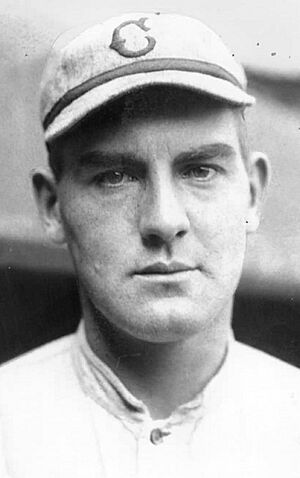Rube Bressler facts for kids
Quick facts for kids Rube Bressler |
|||
|---|---|---|---|
 |
|||
| Left fielder / Pitcher | |||
| Born: October 23, 1894 Coder, Pennsylvania, U.S. |
|||
| Died: November 7, 1966 (aged 72) Cincinnati, Ohio, U.S. |
|||
|
|||
| debut | |||
| April 24, 1914, for the Philadelphia Athletics | |||
| Last appearance | |||
| July 17, 1932, for the St. Louis Cardinals | |||
| MLB statistics | |||
| Batting average | .301 | ||
| Home runs | 32 | ||
| Runs batted in | 586 | ||
| Win–loss record | 26–32 | ||
| Earned run average | 3.40 | ||
| Strikeouts | 229 | ||
| Teams | |||
|
|||
| Career highlights and awards | |||
Raymond Bloom "Rube" Bressler (October 23, 1894 – November 7, 1966) was a talented American baseball player. He played in Major League Baseball (MLB) for many years. Rube started his career as a left-handed pitcher. Later, he became an outfielder and first baseman.
He played for the Philadelphia Athletics from 1914 to 1916. Then he joined the Cincinnati Reds from 1917 to 1927. He also played for the Brooklyn Robins (1928–1931). In his final year, 1932, he played for both the Philadelphia Phillies and the St. Louis Cardinals. Rube Bressler played in two World Series. His 1914 Philadelphia Athletics team lost. But his 1919 Cincinnati Reds team won!
Rube was born in Coder, Pennsylvania. He grew up in a nearby town called Flemington. Before playing professionally, he worked in a railroad shop. He played baseball for his company's team. A scout named Earle Mack discovered him in 1912.
Contents
Rube Bressler's Baseball Journey
Starting in the Major Leagues
In 1913, Rube Bressler pitched for a minor league team. The next year, he joined the Philadelphia Athletics. This was a famous team that had won many championships. Rube made his big league debut on April 24, 1914. He even shared a room with a future Hall of Fame pitcher, Chief Bender.
Rube had a good first year as a pitcher. He won 10 games and lost 4. His ERA was a very low 1.77. The Athletics won the American League championship that year. However, his pitching record got tougher in the next two seasons. He was then sent to play in the minor leagues.
Switching from Pitcher to Outfielder
During World War I, many baseball players joined the military. This created a shortage of players. The Cincinnati Reds of the National League brought Rube back to the major leagues. He pitched well for them in 1918. He won 8 games and lost 5. This earned him two more seasons as a pitcher.
By 1920, Rube finished his pitching career. His total record was 26 wins and 32 losses. His career ERA was 3.40. Even though his pitching career was short, Rube's baseball journey was far from over.
He started playing as an outfielder and first baseman in 1918. He played these positions more and more over the next two years. It became clear that Rube was a great fielder and a strong hitter. From 1921 onwards, he became a full-time position player. He never pitched another game in the major leagues.
Rube Bressler had a very successful career as a hitter. He finished with 1170 base hits. He hit 32 home runs and had 586 runs batted in. His career batting average was an impressive .301.
Players Who Switched Roles
Rube Bressler is one of only a few players since 1900 to start as a pitcher and then become a position player. He played more than 50 games as a pitcher and more than 50 games at other positions. Other famous players who did this include Babe Ruth and Smoky Joe Wood.
Later Life and Achievements
Rube Bressler passed away in Cincinnati when he was 72 years old. He left behind a great legacy in baseball.
In 1963, Rube Bressler was honored for his achievements. He was inducted into the Cincinnati Reds Hall of Fame. This shows how important he was to the team and to baseball history.
 | Emma Amos |
 | Edward Mitchell Bannister |
 | Larry D. Alexander |
 | Ernie Barnes |

